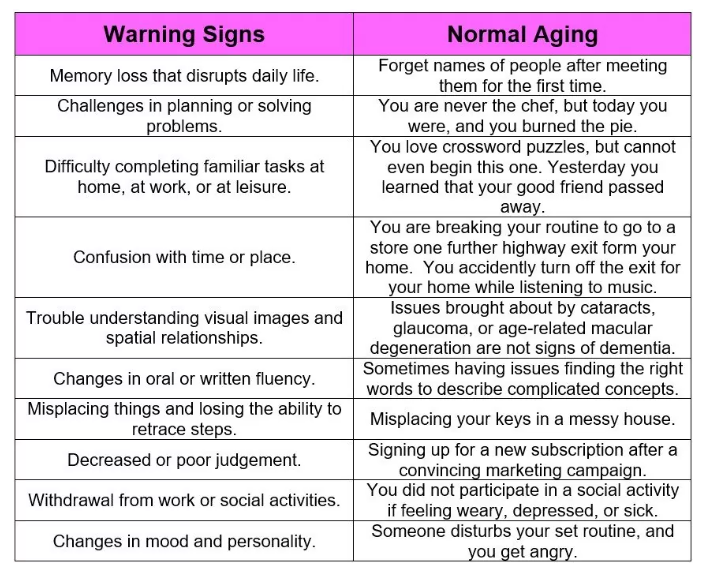Is This Normal Aging?
“My mom’s almost 90. She thought she couldn't understand people because she couldn't hear them,” Debbie says. “After she got new hearing aids, she realized the problem wasn't her hearing. The reality is she can't comprehend. There were several times during the conversation when she said, ‘I don't understand what you're saying.’ It's hard to know if this is just to be expected at her age or if something more is going on.”
Debbie has hit on a conundrum that affects many families and their elderly loved ones. What is considered “normal” aging and what might be a result of dementia or other cognitive issues? How can you tell the difference? And more importantly, what can you do about it?
I’m no expert, but these questions wreaked havoc in my family when both my elderly parents behaved in ways that seemed…off. Not just the occasional forgetfulness or misplaced TV remote. My dad was making decisions that seemed irrational, even for him. He also had trouble driving home from well-known places like his favorite restaurant or the grocery store. And Mom was getting increasingly confused about dates, times, and names. She even seemed a little paranoid, describing snubs and slights that sounded far-fetched coming from good, long-time friends.
The really devastating part was that they still lived alone in the home where we siblings had grown up, with none of us logistically available to provide the increased support we suspected they needed.
If your aging parents are showing signs that could be chalked up to aging or might signify something more concerning, now’s the time to get some help. For yourself and your family, as well as for them.
The first thing to do is get a medical diagnosis of their physical and mental condition. Common, easily corrected problems such as dehydration and urinary tract infections can manifest in a slew of mental/behavioral issues that only a proper work-up can accurately determine. On the flip side, mild cognitive impairment (often a precursor to Alzheimer’s or other dementia) may manifest in subtle ways for years before showing up on anyone’s radar as a medical issue. The point is that we, as laymen, can’t always tell. If your parent or loved one is resistant to seeing a gerontologist (physician specialist in aging) or neurologist (brain/nerve specialist), a visit to their primary care physician or cardiologist could move the conversation in the right direction.
Without an appropriate medical diagnosis and treatment, siblings and family members play a no-win guessing game that can be a mishmash of wishful thinking, relationship dynamics, and facts.
“She’ll do great in assisted living!” my brother insisted, ever the optimist.
“Are you kidding?” I countered. “She needs help with meals, meds, and making it to the bathroom. She’ll never manage without a 24/7 caregiver.”
Without a professional diagnosis, we lacked the objective framework for the treatment, care, and support our parents needed, making it difficult to form a united front.
According to Alzheimer’s Disease International, “Research shows that most people currently living with dementia have not received a formal diagnosis. In high-income countries, only 20-50% of dementia cases are recognized and documented in primary care.” In lower-income countries, the statistics are even worse.
Aging care guru Teepa Snow, adds, “Many people living with dementia do not have a diagnosis. 50% are aware they are changing; 50% are unaware of the changes.”
Liann’s mother has always been sharp, but she’s aware that her memory is failing. As heartbreaking as it is to witness the decline, Liann almost welcomes a time when her mother “doesn’t know that she doesn’t know.” Liann and her sibling are now considering how much help to give their mother, given her desire—and her right—to remain as independent as possible. It’s a delicate and constantly moving target.
So how do we work together as a team to determine our parents’ condition and provide an appropriate level of care? And how do support them while still honoring their desires and preferences?
Knowledge will help inform your decisions as a family. If you’re unsure whether your parents are experiencing normal signs of aging or dementia, here are some resources that might help:
10 Early Signs and Symptoms of Alzheimer’s & Dementia | alz.org
Normal vs Not-Normal Aging and the Positive Approach - Positive Approach to Care (teepasnow.com)
Graphic courtesy of Teepa Snow
The good news is that there are lots of resources available. There’s no upside to ignorance or denial. Take advantage of the tools and support you’ll need to assist your parents and remain on the same page with your siblings. Armed with solid information, everyone will be better equipped to deal with the difficulties—and to recognize the surprising moments of blessing, today and into the future.


